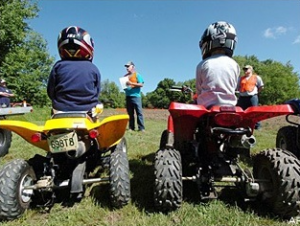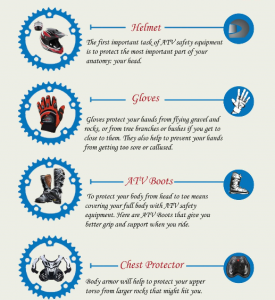 I am sure we have all seen someone carelessly riding an all-terrain vehicle down the road and thought to ourselves how dangerous those vehicles can be. This is especially true when we see children riding or operating these machines. ATVs have become vastly popular with almost 8 million of them in use today. But, with their growing popularity also comes record numbers of riders in the emergency room or dead.
I am sure we have all seen someone carelessly riding an all-terrain vehicle down the road and thought to ourselves how dangerous those vehicles can be. This is especially true when we see children riding or operating these machines. ATVs have become vastly popular with almost 8 million of them in use today. But, with their growing popularity also comes record numbers of riders in the emergency room or dead.
Many children grow up riding ATVs and see no danger in them. Many parents even allow their children to operate these types of vehicles from an incredibly young age without ever obtaining a proper license or wearing protective gear. However, I highly doubt any parent would allow their minor child to get behind the wheel of their car before having a license or permit, so why do we see children driving ATVs and other off-road vehicles so frequently?
Louisiana has laws in place prohibiting children from operating these off-road vehicles on public roads. La. Rev. Stat. §32:417 states that:
A. It shall be unlawful for any person to cause or knowingly permit a minor child under the age of seventeen to drive a motor vehicle or a power cycle upon any public road or highway in this state unless such child shall have first obtained a license to drive a motor vehicle or a power cycle.
In fact, an individual may be charged for the improper supervision of a minor by a parent or legal custodian, who has care and control of the minor, for allowing the unlicensed minor to operate motor vehicle on a public road which results in the serious bodily injury or death of another person (La. Rev. Stat. §14:92.2).
Unfortunately, Louisiana does not have many other laws pertaining to ATVs, especially when being operated on private land. But, when a devastating accident occurs, you want someone to be held liable for your damages.
ATVs are inherently dangerous, so having liability coverage is important in the event that you or someone else is injured from your ATV. If an accident occurs on private land, you may be able to recover based on the landowner’s insurance policy. Depending on the terms and limits of the policy, the insurance company may pay for bodily injury or property damage occurring on the insured property through the policy’s personal liability coverage.
According to a study done by the U.S Consumer Product Safety Commission (CPSC), there have been nearly 16,000 reported ATV related fatalities since 1982. Of those deaths, 21% have been children under the age of 16 years old. And even more frightening, of that 21%, almost half of the fatalities involved children younger than 12 years of age. In addition to the reported deaths, there are nearly 100,000 injuries each year.
The most common injuries sustained from ATV accidents include: 
• Fracture
• Contusion/ Abrasion
• Sprain/ Strain
• Internal Organ Injury
• Concussion
• Laceration
Fortunately, many ATV accident injuries seen by the emergency department are treated and released. However, more serious injuries may require rigorous medical care. CPSC reported that these injuries most frequently affect the head and neck (29%), arm (29%), torso (22%) and leg (21%).
Because ATVs can reach speeds of up to 90 mph and weigh 700 pounds on average, they can be difficult for a child to operate. Not to mention the risk of the ATV tipping over and crushing the passenger with one wrong move. A quick, fun ride can turn catastrophic in the blink of an eye.
To prevent an ATV related accident, individuals should:
Stay on Off- Road Terrain. These vehicles are not designed to be driven on regular paved roads and highways. In fact, it is illegal in many states to ride ATVs on paved roads (see La. Rev. Stat. §32:299). It is essential to stay on off-road terrain to avoid collisions with cars and trucks.
Refrain from Allowing Children to Ride or Operate Adult ATVs. Children younger than 16 should refrain from riding or operating adult ATVs as they do not have the physical or cognitive skills to maneuver the vehicle. Many ATV labels will show the recommended age for that model. Children younger than 6 years old should never even be a passenger. Additionally, you should never have more people on an ATV than it was designed to carry. All of these prohibitions and warnings accompany the vehicle itself and must be followed accordingly to ensure everyone’s safety.
Wear Safety Gear. Always wear a helmet when riding an ATV. You should also wear goggles, gloves, long sleeves, and proper footwear to protect from things like small tree limbs and rocks. Although it may be common to operate these vehicles without wearing all of the proper protective gear, it does not mean you should do it.
Be Trained to Operate Vehicle. Hands on training can provide both first time riders and experienced riders with skills needed to operate an off-road vehicle in any given situation.
Absent any laws or policies, there is not much that can be done in your favor after an ATV accident. This is why it is critical to follow safe practices and think before you ride an ATV without a helmet, seatbelt, or proper boots. How many more times do we have to hear devastating stories about ATV accidents before people take this issue more seriously? A carefree joyride should never end with death or serious injury.
If you have been in an ATV accident, contact us today for a free consultation. PHONE CARDONE at 504-522-3333, 225-706-3920 (Baton Rouge office) or email us at ccardone@cardonelaw.com.
 Louisiana Injury Lawyers Blog
Louisiana Injury Lawyers Blog


